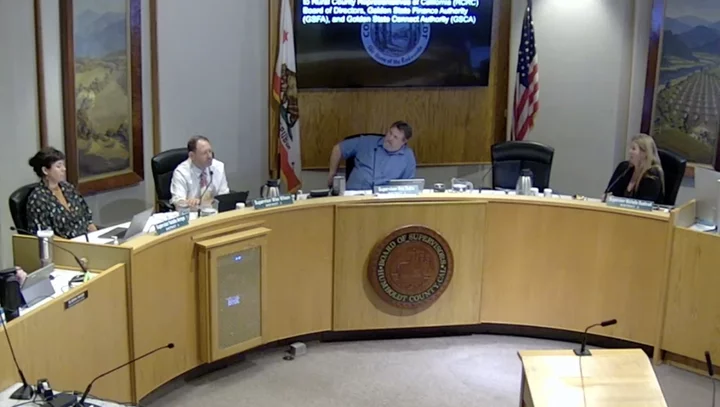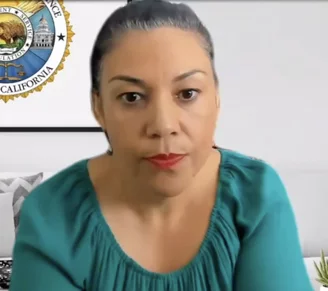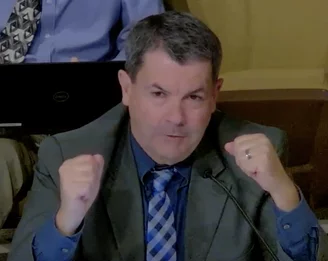Screenshot of Tuesday’s Humboldt County Board of Supervisors meeting.
###
During Tuesday’s meeting, the Humboldt County Board of Supervisors heard a presentation from the state Department of Insurance regarding new rules aimed at addressing California’s longstanding insurance issues.
Since 2022, seven of the state’s top 12 insurers – accounting for 85 percent of the market – have restricted existing policies or stopped taking new business entirely due to increased fire risk in California.
Gov. Gavin Newsom issued an executive order at the end of last month directing Insurance Commissioner Ricardo Lara to take immediate regulatory action “to strengthen and stabilize California’s marketplace for homeowners insurance and commercial property insurance.” Lara responded with a package of proposed regulations that would require major insurers to increase coverage in some of the state’s most vulnerable communities. In exchange, the state would allow companies to set higher rates to offset the cost of doing business in a wildfire-prone state.
Speaking during Tuesday’s meeting, Juanita Juarez, deputy commissioner of community relations and outreach for the California Department of Insurance, said California’s insurance issues date back to the 1960s, when insurers stopped issuing new policies to at-risk communities following the brush fires and Watts riots in Los Angeles in the 1960s.
The state legislature created the Fair Access to Insurance Requirements Plan, better known as the FAIR Plan, in 1968 as a sort of last resort to ensure all California property owners had access to basic fire insurance when coverage was not available through a traditional carrier.
“However, now the FAIR Plan has morphed into the insurance of first resort for many, many people around the state and … in some areas in Humboldt County where people … that’s the only insurance that is available to them,” Juarez said, noting that the program is run by an insurance company, not the state. “Also, the FAIR Plan only allows people to have insurance for wildfires, not for everything else. Consumers have to purchase … a policy from another insurance company, making it an even bigger expense with lesser coverage for the consumer.”
Turning to the board for discussion, Bushnell asked how the new regulations would affect rural residents who can’t get coverage under the FAIR Plan. “[There are] people that are currently buying homes [who] are not able to secure any kind of insurance to close their escrows,” she said. “What would you suggest for those types of situations?”
Juarez urged people seeking insurance through the FAIR Plan to get in touch with the state Department of Insurance. She also offered a helpful tip.
“One of the biggest tips that I could give people is, if you’re having a very hard time finding insurance in your area, you’re working with your local broker … [and] many times they are working with a group of insurance companies that have saturated that market, so their risk in that area is too high, and that is why they’re not covering in that area,” Juarez said. “I would suggest call[ing] an insurance agent or broker in Sacramento or Los Angeles or San Diego even. The idea behind that is maybe they are working with other insurance agencies that might be able to cover your area because they don’t have many [clients] over there.”
Bushnell also asked about retired residents who’ve paid off their homes but can no longer afford insurance due to rising rates.
Juarez said the county, or other local organizations, could look into state grants to help offset the cost of insurance. “We might be able to … work with you and also help to write letters of support for that,” she said. “But at this point, you know, the availability of insurance is in dire need. And so that is what we are working with to try to make sure that we increase [the] number of insurance companies doing business in the state. Hopefully that [will] make it available for those people in the future.”
Third District Supervisor Mike Wilson asked how the Department of Insurance protects “low-value, low-risk” property owners from having to subsidize “high-value, high-risk” properties.
Juarez emphasized that it is the Department of Insurance’s responsibility to make “absolutely sure that no one is discriminated against in any way.”
“The expectation that we have of the insurance companies is that they work with us to make sure that everyone is being covered and that it is being covered appropriately,” she said. “That is why we have we have 1,400 employees in the Department of Insurance [who] review these rates. We have actuaries who review these numbers and lawyers who will go through all of these things very specifically to make absolutely sure that we are being able to cover everyone that is that needs it and that it is not discriminatory in any way.”
First District Supervisor Rex Bohn noted the state’s insurance issues “should have been addressed two years ago because it started four years ago.” On top of that, Bohn said the fire-prone counties have done their part, spending “millions if not billions” fire-safing their communities.
“We’re doing our job,” he said. “People are fire-safing, they’re putting on the right roof, they’re knocking trees down left and right and doing the right thing, and they’re seeing nothing for it. … They will probably keep it up because they benefit from hopefully not burning down, but that has to be recognized.”
Juarez said she would work with county staff to schedule a town hall meeting to speak directly with Humboldt County residents. In the meantime, folks who have questions can contact the California Department of Insurance at 800-927-4357.
Following a brief public comment period, Wilson made a motion to accept the report, which was seconded by Fourth District Supervisor Natalie Arroyo. The motion passed in a 5-0 vote.
Measure S Payment Deadlines
The board also received a report on the status of Measure S cannabis cultivation taxes owed to the county and approved a staff’s plan to recoup the delinquent funds.
Earlier this month, the board unanimously voted, with Second District Supervisor Michelle Bushnell recused, to partially reinstate the Measure S cannabis cultivation tax at 10 percent for the 2024 cultivation year, with taxes due in the 2025 tax year. At that meeting, the board directed staff to come up with a plan to address the 962 permit holders who collectively owe over $14 million in delinquent taxes.
During this week’s meeting, Planning and Building Director John Ford said staff’s proposed plan has two core components: deadlines and consequences.
“We would first go through and assess the …. current permits that owe taxes and do an assessment of whether or not they are likely related to an existing application and existing permit,” Ford said. “If not, we’ll send a letter out indicating that you don’t appear to be active and you have 30 days to bring your tax current. Otherwise, we’re going to take your permit forward for denial.”
Under the proposed strategy, applications that haven’t been active “for some time” will receive a 30-day written notice requiring the applicant to commit to a payment plan with the Humboldt County Treasurer-Tax Collector’s Office to have all taxes paid by Dec. 31, 2024. Applications that are “actively being worked on – including interim permit holders – must commit to a payment plan by Dec. 31, 2023, and have all taxes paid by Dec. 31, 2024. Interim permits will not be extended after Dec. 31, 2023, where taxes are not current or a payment plan is established.
“The idea here is that all of the back taxes that are due would be paid off before the county starts charging taxes again, and that would be for the 2024 [cultivation] tax year, due in 2025,” Ford said. “If everything’s paid off by 2024, then the slate would be clean. … [I]f people are not following their payment plan, their permit could be suspended, and if it’s not brought current within 60 days it could result in revocation. If all the taxes are not current by the end of 2024, then the permit would be brought forward for revocation.”
Turning to the subject of permit fees, Ford noted that there are nearly $830,000 in unpaid permit fees for 568 approved cannabis permits. Staff’s plan proposes to stop work on applications “unless there is a deposit on hand to complete the work on the application through final action.” Applications that are delinquent by more than 90 days will be given written notice to become current, or the permit will be recommended for denial. Approve permit holders will be given 60 days to become current or their application will be suspended.
Speaking during public comment, Natalynne DeLapp, executive director of the Humboldt County Growers Alliance, called the plan “a representation of good governance.”
“Having rules, deadlines and consequences is what helps us all have boundaries and succeed in life,” she said. “I have one main point that I would really recommend, and that is simply to shift the date from Dec.31 [2023] to Mar. 31 [2024]. Right now, we’re deep in the middle of harvest and we also have a lot of county government closure deadlines between now and Dec. 31. So, just being cognizant of timing, if we can kick this to Mar. 31 that would be best for farmers [and] that would also allow them to meet with their accountants and bookkeepers.”
DeLapp also recommended staff shift the tax payment deadline from Dec. 31, 2024, to Mar. 31, 2025.
Following public comment, Wilson asked Ford if the 90-day extension would make a difference to staff. Ford said the dates “are somewhat subjective,” adding that the extension would still allow all the taxes to be paid before Measure S taxes resume in 2025, “which is the real goal.”
Wilson made a motion to approve staff’s recommendation with the suggested change to push the deadlines out by 90 days, which was seconded by Arroyo.
Fifth District Supervisor and Board Chair Steve Madrone, who attended Tuesday’s meeting via Zoom, wasn’t keen on pushing extending the deadline, stating “I don’t want to reward irresponsible behavior anymore.”
“The only way we’re ever going to get any of [these] tax or fees paid is to set some firm deadlines,” Madrone said. “For those that did not come in and have had ample opportunity to do so that have not set the payment plan, I would actually move the deadlines forward rather than backward or further out. … Those that have paid their taxes completely … it’s unfair to them that others that have not set up a payment plan and have not paid their taxes or fees are continuing to grow.”
After a bit of back and forth on the merits of pushing out the deadline, the board voted 3-1, with Bushnell recused and Madrone casting the dissenting vote, to approve staff’s recommendation with the small amendment to extend the deadlines by 90 days.
###
You can find our previous coverage of Tuesday’s meeting, including the board’s discussion on Bohn’s inclusion of a firearm in an auction basket at a recent meeting of the Rural County Representatives of California, at this link.



CLICK TO MANAGE